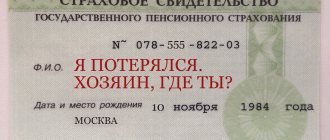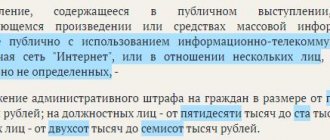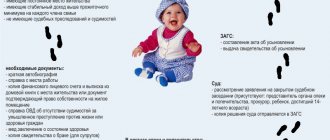Home / Family law / Children's rights
Back
Published: 08/15/2018
Reading time: 8 min
1
634
Minors are among the vulnerable categories of citizens. Therefore, every rule of law state must pay close attention to the protection and enforcement of the rights of citizens under the age of majority.
A child (minor) is every person under the age of 18. He is assigned corresponding duties and rights that must be respected on the territory of all constituent entities of the Russian Federation.
- Child's rights
- Rights of the child in the family
- Examples of violations and protection of children's rights in Russia
- Arbitrage practice
- Where to contact?
- Responsibility
On the territory of the Russian Federation, the rights of minors, the relationship between children and their parents or legal representatives (guardians), as well as liability for violation of these rights are regulated by:
- Constitution of the Russian Federation;
- Civil, Family and Criminal Codes of the Russian Federation;
- Federal Law “On Basic Guarantees of the Rights of the Child in the Russian Federation”;
- Federal Law “On Education”;
- local acts of educational institutions;
- regulatory acts of the constituent entities of the Russian Federation.
In addition, every minor who is a citizen of the Russian Federation is protected by international law (for example, Article 6 of the UN Convention on the Rights of the Child, under whose jurisdiction the Russian Federation falls).
The Russian Federation, as a UN member state, is obliged to respect the rights of its minor citizens and promptly suppress violations of their rights and freedoms.
Child's rights
According to the standards established by Russian legislation and international conventions, children have the right to comply with:
- individuality: own name, civil status, life with parents;
- freedom of expression , expression of one’s views, desires and needs in any form;
- freedom of conscience and religion;
- protection from physical, sexual and psychological violence from anyone: parents, legal representatives or third parties;
- protection from slavery and forced captivity , including labor slavery;
- receiving assistance and protection from the state in case of loss of contact with family and immediate relatives;
- full material support from parents or guardians , ensuring full social, physical, mental and psychological development (according to Article 60 of the RF IC);
- rights to education, medical and social assistance.
Problems and consequences
If a child endures physical and psychological violence, this will negatively affect his health. Such actions can lead to the development of serious illnesses.
Psychological violence is even worse than physical violence, because it leads to a distortion of the child’s personality and the formation of incorrect ideas about the world around him.
Children who have been subjected to psychological violence feel insecure and are not ready to build normal relationships with other people in adulthood.
Rights of the child in the family
The child has the right:
- live and be raised in a family (except for cases where such living poses a threat to his life and health), in the absence of parents or in the presence of parents deprived of rights - in government institutions;
- have your own first name, patronymic and last name (from the age of 14 - the right to voluntarily change your name);
- communicate with blood relatives of father and mother (including after parents’ divorce);
- express your opinion openly;
- receive income (scholarship, salary);
- own movable and immovable property , inherited or received as a gift.
The list of the most common violations of the rights of a minor by parents includes:
- insults and humiliation of human dignity;
- physical violence and threats of violence;
- lack of care and negligent attitude towards meeting the basic needs of the child;
- leaving unattended for a long period of time;
- obstruction of movement , prolonged ban on leaving the house or room;
- misuse of funds from maternity capital - deprivation of children of property due to them by law;
- deprivation of the opportunity to receive adequate nutrition, education and medical care.
Methods of punishment under the law
The Russian Federation provides for liability for violation of children's rights. This can be an administrative or criminal penalty, it all depends on the severity of the offense.
Criminal punishment is applied to citizens who involve a minor in criminal activity. The sanction is tougher if the culprit is the parent of the offspring. There are other situations that will attract criminal liability:
- Involvement of the child in the use of alcoholic beverages or drugs.
- The child was forced to engage in vagrancy or begging.
The Criminal Code of the Russian Federation states that if parents abuse their children, they face imprisonment for up to three years.
Examples of violations and protection of children's rights in Russia
Most cases of violations of the rights of minors in Russia are associated with unlawful actions of parents, school teachers and educators.
Employees of preschool institutions often commit the following violations:
- illegal refusal to obtain a place, as well as expulsion without a sufficiently compelling reason;
- psychological violence: intimidation, insults, social isolation;
- neglecting the needs of children and leaving them without supervision.
In Russian schools, cases of violations such as:
- unlawful removal or exclusion of students from lessons;
- forcing students to attend electives and sections;
- public insult of students by teachers and other school employees.
When is love inappropriate?
How to change the class teacher?
Article on the topic Electronic primer. What will happen with the introduction of electronic textbooks in schools? If a child or his parents have a conflict with the teacher, and all the other 24 students are happy with him, you can move to another class. To do this, you need to contact the school principal. With a clear explanation of the reasons, the administration can accommodate. In the event of a collective complaint from the parents of most students, the class teacher will most likely be replaced.
What to do if an informal relationship arises between a teacher and a student?
Even at the slightest suspicion that an adult (sexual) relationship has arisen between a teacher and a student, parents need to intervene immediately and react very firmly. Notify the administration of the educational organization. Insist on an internal investigation. Talk to this teacher in the presence of the head of the school. If suspicions are confirmed, immediately contact law enforcement agencies. And control the course of events.
Arbitrage practice
Article 57 of the Family Code of the Russian Federation speaks of the right of a small citizen to express his opinion when resolving any issue in the family, as well as to have the right to be heard during judicial or administrative proceedings, provided that the child reaches the age of ten years, except in cases contrary to his interests.
However, during the study of judicial practice, violations are often revealed, associated, for example, with the consideration of cases on determining the place of residence of a child in the event of separation of his parents, when the opinion of a child who has reached the age of ten with whom he wants to live is not taken into account.
Thus, one of the courts of the Perm Territory made a decision to determine the place of residence of a twelve-year-old teenager, while the opinion of the child himself was not taken into account by either the guardianship and trusteeship authorities or the court, and the decision itself was not motivated by the court in any way.
Also, judicial practice speaks of cases when the court does not take into account the opinion of the child, when parents in court enter into an amicable agreement on the child’s place of residence , thereby violating the requirements of Art. 57 RF IC.
A striking example of such a violation is the approval by a judge of one of the Novosibirsk courts of a settlement agreement between the parents of two minor children. At the same time, the place of residence of the 13-year-old daughter was determined to be with her mother. and the place of residence of the 7-year-old son is with his father. The opinion of the teenage girl was not taken into account by the court.
In some cases, also bypassing the requirements of Article 57 of the RF IC, the opinion of a child who has reached the age of 10 years on the issue of the need to deprive his parent of parental rights was not taken into account.
Memo for parents “How do we violate the rights of a child?”
“How do we violate the rights of the child?”
What prevents us from communicating with him?
1. Orders, commands: clean up, stop, go home quickly, shut up, etc. - carry disrespect for the child, who begins to feel powerless, or even abandoned in trouble.
2. Warnings, admonitions, threats: “if you don’t stop crying, I will leave,” “make sure it doesn’t get worse,” drive the child into a dead end; with frequent repetition, the child gets used to them and stops responding to them.
3. Morals, moral teachings, sermons: “You must behave properly.” Usually children do not learn anything new from such phrases. They feel the pressure of external authority, sometimes guilt, sometimes boredom, and most often all combined. Does this mean that we shouldn’t talk to children about moral standards and rules of behavior? Not at all. However, this should be done only in their quiet moments, and not in a heated situation.
4. Advice, ready-made solutions: “You just say...”, “In my opinion, you need to go and apologize.” Children are not inclined to listen to our advice. Every time, advising something to a child, we seem to inform him that he is still small and inexperienced, but we are smarter than him and know everything in advance. This position of parents – the position “from above” – irritates children, and most importantly, does not leave them with the desire to tell more about their problem.
5. Proofs, logical arguments, notations, “lectures”: “It’s time to know that you can’t use dirty hands...”, “How many times have I told you...”. And here the children answer: “Leave me alone,” “As much as possible,” “Enough!” At best, they stop hearing us, and what psychologists call a “semantic barrier” or “psychological deafness” arises.
6. Criticism, reprimands, accusations: “What is it like!”, “I did everything wrong again!”, “Forever you!..”. Such phrases cause in children either active defense, or despondency, depression, disappointment in themselves and in their relationship with their parent. In this case, the child develops low self-esteem.
7. Name-calling, ridicule: “Crybaby”, “You’re a bad girl”, “Well, you’re just a dumbass!”, “What a lazy person you are!” All this is the best way to push a child away and “help” him lose faith in himself. As a rule, in such cases, children get offended and defend themselves: “What is she like?”, “Well, I’ll be like that!”
8. Guesses, interpretations: One mother loved to repeat to her son: “I see right through you and even two meters below you!”, which invariably infuriated him. And in fact, which of the children (and even adults) likes to be “figured out”? This can only be followed by a defensive reaction, a desire to avoid contact.
9. Questioning, investigation: “No, tell me anyway,” “I’ll find out anyway.” It is difficult to resist asking questions in a conversation. Still, it’s better to try to replace interrogative sentences with affirmative ones.
10. Verbal sympathy, persuasion, exhortation. Of course, a child needs sympathy. However, there is a risk that the words “I understand you”, “I sympathize with you” will sound too formal. Maybe just stay quiet and hold him close instead. And in phrases like: “Calm down”, “Don’t pay attention!”, “It will grind, there will be flour”, he can hear the neglect of his worries, the denial or downplaying of his experiences.
A child is also a person!
Of course, it is impossible to respect children's rights through laws alone. It is very important that every adult changes their psychological perception of a child as someone who has neither rights nor responsibilities. Unfortunately, today the rights of a small citizen as something real, and he himself as a valuable person in his own right, are not yet recognized by many. There is even an opinion that children should not be told about their rights, otherwise they will turn out to be completely “uncontrollable.” However, self-esteem, destroyed and humiliated in childhood, is practically not restored. Children, and especially teenagers, who have lost faith in goodness and justice, are usually the most difficult and unhappy.
And finally, I would like to remind you that every person has as many rights as he wants to have.
"Child Abuse: What is it?"
Child abuse is not just beating, stabbing, sexual assault and other ways in which adults hurt a child. This is humiliation, bullying, various forms of neglect that hurt children's
soul.
Neglect can be expressed in the fact that parents do not provide the child with the necessary amount of food, clothing, sleep, and hygiene care. In addition, neglect is manifested in a lack of respect, attention, affection, and warmth on the part of parents.
Abuse of children (minors, from birth to 18 years of age) includes any form of mistreatment committed by parents (other family members), guardians, trustees, teachers, educators, and law enforcement officials.
The four main forms of child abuse are:
*Physical violence is the intentional infliction of physical harm.
*Sexual abuse (or corruption) is the involvement of a child, with or without his consent, in sexual activities with adults for the purpose of obtaining satisfaction or benefit from the latter.
*Mental (emotional) violence is a periodic, long-term or constant mental impact on a child that inhibits personality development and leads to the formation of pathological character traits. Mental forms of violence include:
- open rejection and constant criticism of the child;
— verbal threats against a child;
- remarks made in an offensive manner, degrading the dignity of a child;
— deliberate physical or social isolation of a child;
- lies and failure by adults to keep their promises;
- a single harsh mental impact that causes mental trauma in a child.
*Neglect of the needs of a child is the lack of basic care for a child, as a result of which his emotional state is disrupted and a threat to his health or development appears. Neglect of a child’s basic needs includes:
— lack of food, clothing, housing, education, and medical care adequate for the child’s age and needs;
- lack of proper attention and care, as a result of which the child may become a victim of an accident
Protection of the rights and dignity of the child in legislative acts:
The UN Convention on the Rights of the Child defines the concept of “abuse” and defines protective measures (Article 19), and also establishes:
— ensuring, to the maximum possible extent, healthy personal development (Article 6);
— protection from arbitrary or unlawful interference in the personal life of a child, from attacks on his honor and reputation (Article 16);
— ensuring measures to combat disease and malnutrition (Article 24);
— recognition of the right of every child to a standard of living necessary for physical, mental, spiritual, moral and social development (Article 27);
— protection of a child from sexual assault (Article 34);
— protection of the child from other forms of abuse (Article 37);
— measures to help a child who is a victim of cruel treatment (Article 39).
The Criminal Code of the Russian Federation provides for liability for:
- for committing physical and sexual violence, including against minors (Articles 106-136);
- for crimes against family and minors (Articles 150-157).
The Family Code of the Russian Federation guarantees:
— the child’s right to respect for his human dignity (Article 54);
— the child’s right to protection and the duties of the guardianship and trusteeship authority to take measures to protect the child (Article 56);
— deprivation of parental rights as a measure to protect children from abuse in the family (Article 69);
— immediate removal of a child in the event of an immediate threat to life and health (Article 77).
The Law of the Russian Federation “On Education” affirms the right of children studying in all educational institutions to respect for their human dignity (Article 5) and provides for administrative punishment of teaching staff for physical or mental violence against the child’s personality (Article 56)
“Is it possible to do without punishment?”
Attitudes towards punishment have changed over the centuries. Thus, the proverbs and sayings of the Russian people reflect the need for physical punishment. For example, “You can’t drive a child into a grave with a rod, and you can’t lure a child out with a roll of bread,” “Love your son with a rod,” “An unpunished son is a dishonor to his father,” “With a fist and in the back, love your son.”
In 1989, the UN adopted the Convention on the Rights of the Child. It states that children have the right to special care and assistance; For the full and harmonious development of his personality, a child needs to grow up in a family environment, in an atmosphere of happiness, love and understanding. Violation of the rights of young children and their dignity is quite common. These violations often arise as a result of incompetent educational influences on the child. Regulatory documents on the protection of the rights of the child are the “Convention on the Rights of the Child”, the Federal Law “On Basic Guarantees of the Rights of the Child in Preschool Institutions”, the Law of the Russian Federation “On Education”, the Family and Criminal Codes. According to the requirements of the Convention and legal documents of the Russian Federation, a child has the right to protection from physical, psychological violence, insult or abuse. Children have the right to love and care. In addition, lack of care or careless, rude treatment is considered unacceptable. For example, hitting a child means violating his rights. Violating a child's dignity can cause serious psychological harm. It is important to respect personal privacy. Determine only actions, actions, tell the child not “You are bad”, but “You did something bad”, not “You are cruel”, but “You acted cruelly”. Give only positive advances. You cannot deprive a child of well-deserved praise, and in no case should you take away what was given to you.
L.N. Tolstoy wrote: “Punishment is harmful because it embitters the one who is being punished... The desire to punish is the desire for revenge.”
Physical punishment is unacceptable. By resorting to physical force, parents only prove their complete inability and inability to find a reasonable way to influence the child. There were cases when the consequences of physical punishment were weakening of hearing and nervous diseases. But the greatest harm is that physical punishment humiliates the child’s personality, convinces him of his own powerlessness, and gives rise to bitterness. The child loses faith in his own strength and self-respect, that is, those valuable qualities that parents should especially carefully and lovingly cultivate in him. Physical punishment teaches children the wrong, uncivilized way to solve problems. The guidance of parents frees the child from feelings of guilt, and he believes that he is free to do as he pleases, and develops stubbornness in him. As a result of physical punishment, children with a strong nervous system grow up to be rude, cruel, and deceitful; children with a weak nervous system grow up to be fearful, lethargic, and indecisive. Both of them, as a result of physical punishment, develop alienation in their relationships with their parents. Children cease to respect their elders, to reckon with them, and experience a feeling of revenge and fear.
One of the characteristic features of recent centuries is humanity’s refusal to use sharp painful effects in education, training, and training. Painful methods, which have not even justified themselves in criminal punishment, do not help in raising children and delay the training of the animal.
What is pain? This is a signal of acute danger for the body, requiring immediate and energetic measures to avoid this danger now and in advance, to beware of it. Pain is a biologically expedient signal.
The essence of education today is the creation in a child of a complex system of subtle differentiated skills in work, academic work, and behavior. It is easier to teach a child household and work skills without punishing them for mistakes, but by gently correcting them, because fearing punishment, a person most often makes a mistake. Painful exposure causes reactions of rage or fear.
Today, the teacher’s weapon is a kind word, patient, reasonable influence, help, and support.
Often adults threaten to give the child to the uncle, put him in a bag, leave, give him an injection, etc. Often adults do not fulfill their promises, and the child gets used to threats. At the same time, the use of threats and various types of intimidation of a child leads to the emergence of children's fears and anxiety. The child begins to be afraid of the dark, loneliness, and doctors.
Psychologists have devoted a lot of research to human self-analysis, which is called differently: self-perception, self-image, self-evaluation, and more often - self-esteem. Self-esteem greatly influences a person's destiny. Thus, children with low self-esteem, but quite capable, study worse, get along poorly with peers and teachers, and are less successful later in adulthood. The foundation of self-esteem is laid very early, in the very first years of a child’s life, and depends on how his parents treat him. If they understand and accept him, tolerate his shortcomings and mistakes, he will grow up with a positive attitude towards himself. If a child is constantly “educated”, criticized and drilled, his self-esteem turns out to be low and flawed. The child perceives himself as others see him. A positive attitude towards oneself is the basis of psychological survival, and children constantly seek and even fight for it. Every child is waiting for confirmation that he is good, that he is loved, that he can cope with any task. These are the natural aspirations of every person who forms an attitude towards himself.
Punishment cannot be considered as a mandatory method of influence. In raising children of preschool age, you can do without it if the adult takes into account age characteristics and thoughtfully treats the individual characteristics of the child.
If you cannot do without punishment, then you need to remember some rules that V.L. Levi recommends:
- punishment should always come from the motive of the action;
It often happens that the result of an action turned out to be difficult, although the motive that guided the child was positive. For example, a child stood up for the younger one (a girl) and hit the offender.
- the basis for punishment can only be immoral actions: deliberate violation of the interests of the family, refusal to obey a reasonable demand, careless attitude towards things, causing offense or harm to someone around, rudeness, etc.;
- for the child to understand the punishment, it must be fair and adequate to his guilt;
- punishments should not be too frequent, as children get used to them and become indifferent to the influence of their parents;
- the statute of limitations for the offense should be taken into account. Late punishments remind the child of the past, but do not allow him to become different. Punished - forgiven, the incident is over, not a word about old offenses.
- you cannot punish or scold a child when he is sick, when he is eating, after sleep, before bed, during play, during classes, immediately after a physical or spiritual injury;
- you cannot punish a child when he fails at something, but he tries;
- you should refuse punishment when you are upset, upset, sick;
- punishment should not harm health;
- for one offense - one punishment.
Pedagogical justified punishments include:
- a remark, but made in such a way that it reaches the child’s consciousness;
- reprimand - talk seriously and strictly about the inadmissibility of inappropriate behavior;
- depriving the child of something pleasant that he can do without: watching his favorite TV shows, treats, etc., but it is important that he knows what he is being punished for.
It is unacceptable to punish children with work, since work should be joy.
Where to contact?
If a child’s rights are violated at school, parents should first seek clarification from the teacher or school administration. If parents are not satisfied with the explanations, they have the right to submit a written complaint to the director of the educational institution and receive a written response regarding the current situation. If the written response also does not satisfy the parents, you can contact higher educational authorities.
Based on the nature of violations of children’s rights, you can contact the regional ombudsman for children’s rights, local guardianship authorities, the prosecutor’s office, the police, and the court.
In case of violation of the rights and legitimate interests of children by parents or guardians, as well as in case of non-fulfillment or improper fulfillment of responsibilities for upbringing, education, abuse of parental rights, the child himself has the right to seek protection from the guardianship and trusteeship authorities, and when the teenager reaches the age of 14 - to court.
The following may report a violation of the rights of a minor to the competent authorities:
- the child himself;
- parents or legal representatives;
- relatives;
- neighbors and school teachers;
- third parties who witnessed the violation of rights.
A sample complaint about violation of children's rights by employees of an educational institution can be viewed at the link.
Rights of the child from birth and by age
The legal status of a child changes as they grow older. The older the little citizen, the more rights to independent actions and decisions he acquires. Let us briefly consider the gradation of children’s rights in the Russian Federation depending on age:
- 1.5 years. The child has the right to attend the nursery.
- 3 years. Children can be sent to kindergarten.
- 6 years. The child receives the right to attend school (the Constitution of the Russian Federation) and make small household purchases (office supplies, groceries). He can enter into transactions to dispose of funds provided by legal representatives, with their consent. Any transactions can also be concluded with the aim of receiving benefits free of charge, which do not require notarized confirmation.
- 8 years. Children can participate in public associations (Federal Law No. 82-FZ “On Public Associations” dated May 19, 1995).
- 10 years. The right to express an opinion appears, which may affect the change of name, place of residence with one of the parents, or adoption.
- 14 years old. At this age, the list of rights increases significantly. Upon turning fourteen years old, a child has the right to change citizenship, cancel adoption, dispose of personal earnings at his own discretion without parental consent, and bear responsibility for transactions made. You can independently dispose of the results of intellectual activity and protect your personal interests in court. You can work part-time after school.
- 15 years. A teenager can get a job and make decisions about medical interventions.
- 16 years. If there is a good reason, you can get married. This will require permission from local authorities. At the age of sixteen, teenagers can become members of cooperatives.
- 18 years. Young people are becoming adults.
Responsibilities of the student at school and in the classroom
Full protection of the rights of all citizens is permissible only if all members of society comply with their duties. One person's freedom ends where another begins. In this regard, in addition to a wide range of rights, there are also certain obligations of students. Let's look at some of them:
- The child must show respect to teachers and all school employees.
- A conscientious attitude towards learning is one of the basic responsibilities.
- Compliance with the school regime and internal standards, in particular, uniforms.
- If a student missed school for a valid reason, a corresponding certificate or other document must be attached.
- Compliance with safety regulations.
Responsibilities of students
One of the responsibilities of parents is to provide the child with everything necessary both before the school year and during it. If the family is low-income, then the parents are provided with financial support from the state.
As for the student’s responsibilities directly in the classroom, these include:
- conscientious and complete completion of homework;
- presentation of the diary at the request of the teacher;
- listen carefully to what the teacher says;
- bring to class everything that is required for it - notebooks, textbooks, stationery, and so on;
- absence of unnecessary items in the backpack - toys, gadgets;
- at the teacher’s request, go to the board and answer, or immediately express your unpreparedness for the lesson;
- come to class on time.
Silence must be maintained during the lesson. If a student wants to go out or ask something, he must first raise his hand.
Healthy! Doing homework is one of the students' responsibilities that gets ignored more than any other.








